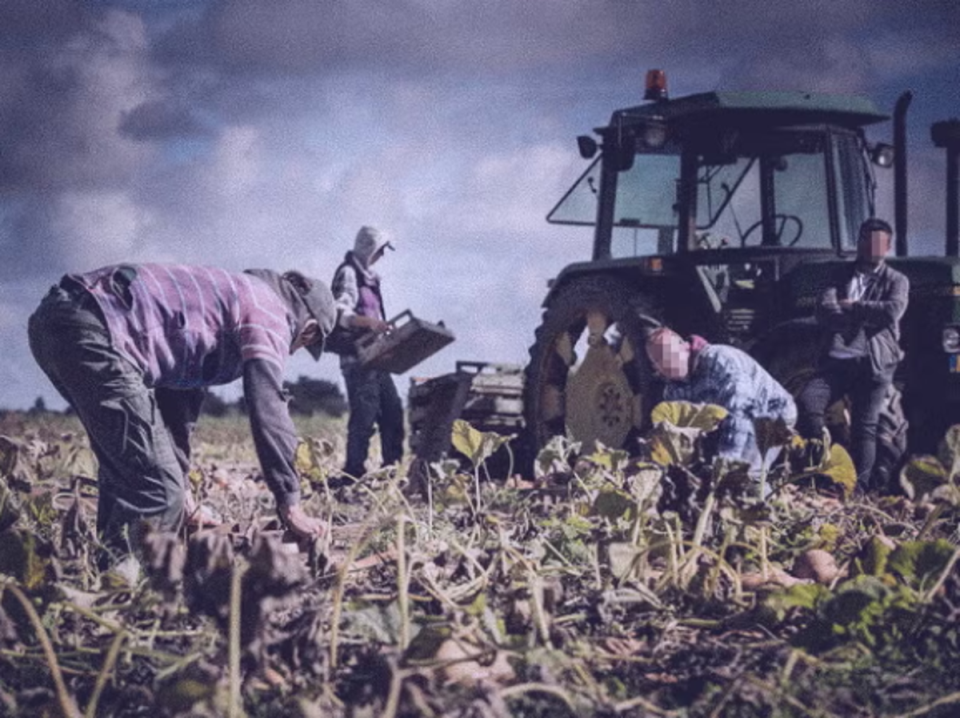Migrant fruit pickers saddled with debts of up to £5,500 to come to UK through government scheme
Migrant fruit pickers coming to the UK to work on farms are being saddled with debts of up to £5,500 before they arrive, a report into the seasonal worker visa scheme has found.
The workers, many of whom come from central Asian countries, are paying £1,231 on average to middlemen who help them get jobs through the government’s seasonal worker scheme. Those from Kazakhstan, Tajikistan, Nepal and Indonesia are forking out the most to come to the UK, with many returning to their home countries in a worse financial situation than when they started.
Most workers interviewed by researchers – 72 per cent – reported taking out a loan to cover the costs of coming to the UK. One 32-year-old woman from Kazakhstan, named in the report as Amina, told academics: “A lot of people in Kazakhstan have sold their belongings or their assets just to have enough money to come here. Hoping that it would be better here and they can earn more money.
“Can you imagine? Sold everything they owned. There are some people who leave their jobs to come here, because they are told that it would be better here. They see it on TikTok, Telegram or Instagram videos and everything looks perfect and beautiful. But once they arrive here, it’s completely different. It is just an image, a deception.”

The seasonal worker scheme allows UK growers to hire around 45,000 people a year on six-month visas. An investigation by the Bureau of Investigative Journalism and The Independent uncovered evidence last year that agricultural workers who came to the UK were publicly humiliated, not paid for all the hours they worked, and forced to live in substandard conditions.
In a new report, researchers at Focus on Labour Exploitation (FLEX) interviewed 83 migrant workers and got 399 survey responses from people on the seasonal worker visa route between June 2022 and October 2023. Two in five workers reported receiving a contract in a language they did not understand. Recruitment of workers from Central Asia is now almost three times higher than in Europe, with Kyrgyzstan emerging as the leading nationality.
Oksana, a 49-year-old woman from Ukraine, said: “I would appreciate if we were told the truth before coming here. Otherwise, people will stop coming here for work. Usually people arrive, work for a bit and then [try] to leave to a different farm.”
Several workers said they had paid a job-finding fee or were charged by an agency to access application systems that are free to use.
Safiya, 44, from Kazakhstan, said: “I was really struggling financially and I had to borrow money from my neighbours and relatives. I paid £600 to the third party who arranged everything for me.” Amir, 48, also from Kazakhstan, told researchers that he took out a loan from the bank to cover the costs of coming to the UK, but that he hadn’t paid it back yet.
Mansur, 32, from Kazakhstan, added: “People are risking their assets and are even selling their belongings or anything they can to be able to come here with a hope to earn more money than they have just invested by selling their stuff. A lot of people have done that, sold their stuff, took out loans. Everyone here on the farm has taken out a loan from the bank in their country of origin to get here.”
One case worker at an organisation supporting migrant workers said that some fruit pickers were returning to their home countries with a higher debt than when they arrived.
Oliver Fisher, research manager at FLEX, said: “The findings of this research indicate that a large number of people on the scheme are being subjected to preventable risks, including risks of deception. We know where the risk areas are on the visa route and the research backs up what we have been saying to government for years.”
A Home Office spokesperson said: “The welfare of visa holders is of paramount importance, including in the seasonal workers scheme, and we are clamping down on poor working conditions and exploitation.
“The seasonal workers route has been running for four years and each year improvements have been made to stop exploitation and clamp down on poor working conditions while people are in the UK. We will always take decisive action where we believe abusive practices are taking place or the conditions of the route are not met.”


